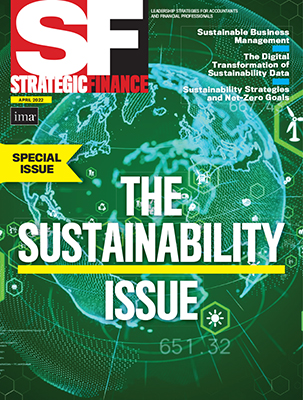Environmental, social, and governance (ESG) factors and metrics continue to grow in relevance for accounting and finance professionals across the globe. Management accountants have the opportunity to take a leadership role in establishing more transparency and advocating for ESG metrics and sustainability standards to inform strategic planning as ethical initiatives in their organization. To date, most business decisions have focused on meeting the needs of large multinational corporations’ external investors and fulfilling sustainability reporting and other nonfinancial disclosure requirements. Accounting and finance professionals in business can lead developments in ESG reporting and strategic planning to help their organization create long-term sustainable value for all stakeholders.
Due to the rapidly changing regulatory landscape, the consequences of failing to address ESG risks are considerable. Management accountants who possess ESG reporting and other nonfinancial disclosure responsibilities must prioritize sustainability and commit to incorporating ethical standards and principles throughout their workflow. Fortunately, there’s a growing trend of professional exchanges focusing on how to promote and align business ethics with operational and strategic ESG objectives.
Examples of organizations leading this charge include the International Ethics Standards Board for Accountants (IESBA), International Sustainability Standards Board (ISSB), Sustainability Accounting Standards Board (SASB), and the U.S. Securities & Exchange Commission (SEC). These efforts to enhance the ESG global ecosystem aren’t without challenges that require effort and resources to overcome.
ESG DATA COLLECTION AND MEASUREMENT
A challenge faced by most organizations is the accurate and timely collection of nonfinancial data, as most ESG factors historically haven’t been treated as core business data. Based on a survey of finance leaders across 12 industries and six countries, a January 2022 Accenture report found that almost half of companies don’t have sufficient resources to track ESG metrics and implement initiatives to improve ESG performance. Further, only a third of respondents claim that their organizations have fully embedded ESG data into their core operations and management information systems, while almost three-fourths of companies use manual or semimanual processes for ESG reporting. These findings highlight the opportunity for management accountants to help their organizations and enhance their career through spearheading an ESG transformation.
Recommendations for spurring action at your company include leading an internal cross-functional project to create an ESG data assessment and establishing policies and procedures to promote sustainability throughout the organization. All efforts to improve integrated reporting on ESG metrics should be underpinned by ethical principles such as honesty, fairness, objectivity, and responsibility, as described in the IMA Statement of Ethical Professional Practice. These principles can help guide you through your ESG journey.
LACK OF STANDARDIZATION
Another major challenge facing management accountants in the quest to improve ESG reporting and sustainability disclosures is that everyone is speaking a different language. With multiple competing frameworks and various terminology throughout the world, an ethical challenge that management accountants face is how to present credible information. This is critical, as regulators are watching and implementing their enforcement powers. For example, in April 2021, the SEC’s Division of Examinations issued a risk alert that provided insight into potential ESG reporting violations relating to misleading disclosures and other public statements.
As a part of maintaining competence and displaying leadership and professional expertise, management accountants should invest time to fully understand the rapidly changing ESG landscape. Staying abreast of risk alerts, issuances of new standards, and interpretations by professional bodies will help those in reporting roles achieve competence in ESG standards and metrics.
Management accountants should also bear in mind the responsibility toward the principle of credibility as it relates to ESG reporting. It’s imperative that they communicate information fairly and objectively and provide all relevant information that could reasonably be expected to influence stakeholders’ understanding of the organization.
MATERIALITY AND ESG DEFICIENCIES
Management accountants likely have made internal business decisions based on both quantitative and qualitative materiality assessments. An important distinction to identify as part of a risk assessment is that ESG factors should have their own stand-alone materiality based on the company’s sector and industry. A useful resource is the SASB’s sustainability-based industry classification system consisting of 77 industries across 11 sectors.
Additionally, it’s possible that control issues of various impacts arise during the ESG integrated reporting process. Ideally, most deficiencies will be considered insignificant and hence won’t require the application of substantial professional judgment to assess whether to externally report a data set. As the impact increases to a serious or disastrous level, however, deciding when and how to externally report it will become more difficult. Ensure that your company’s ESG disclosures aren’t misleading.
The next steps that professionals can take to become ESG, sustainability, and ethics influencers may vary. As a management accountant, embrace this new role in ESG reporting while also adhering to the IMA Statement’s principle of responsibility and the standard of competence. I encourage management accountants to continue to raise awareness within their organizations about the evolving impacts of ESG metrics and sustainability standards currently transforming our profession.

April 2022



